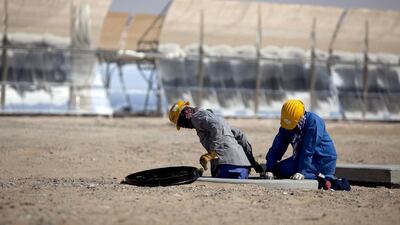The 100MW Shams 1 solar power project covers 2.5 square kilometres and comprises more than 258,000 mirrors mounted on 768 tracking parabolic trough collectors. The reflective surface focuses sunlight on to pipes filled with a coolant to generate high-pressure steam that drives a conventional steam turbine.
Construction began at the Madinat Zayed site, located around 120 kilometres south-west of Abu Dhabi, in the third quarter of 2010. Financing agreements for the US$600 million Shams 1 concentrated solar power (CSP) project were concluded in March 2011, after construction work had already begun.
Masdar, France’s Total and Spain’s Abengoa worked together as the sponsors of the project alongside 10 lenders: BNP Paribas, KfW, Mizuho, National Bank of Abu Dhabi, Natixis, Société Générale, Sumitomo Mitsui Banking Corporation, Bank of Toyko-Mitsubishi, Union National Bank and WestLB.
It was the first utility-scale CSP project in the Middle East and the first renewable energy project to be project financed. Under the 22-year non-recourse financing structure, the sponsors were responsible for building and running the project. Power is sold to Abu Dhabi Water and Electricity Company (Adwec) under a 25-year power purchase agreement.
The price of the power is fixed and is therefore structured in a similar way to Abu Dhabi’s conventional power plant agreements.
However, because of the higher costs associated with generating power from renewable resources, the power purchase price for Shams 1 needed to be set at a higher level than Abu Dhabi’s gas-fired plants. This posed a dilemma for the project. Under Abu Dhabi law, Adwec has an obligation to buy electricity at the cheapest available price.
The sponsors dealt with this problem by creating two revenue streams. “The power purchase price was split into a power purchase price comparable with the economic purchase price and a separate subsidy payment, known as a green payment,” said Allen & Overy’s Stephen Knight. “The first [as per the existing Abu Dhabi IWPPs] was paid for by Adwec. The green payment was paid by the government.”
This arrangement proved attractive to the lenders. As part of the payment was to be made by the Abu Dhabi Government, the banks perceived the payment as almost risk-free.
When it came to sourcing debt to finance the project, the deal was oversubscribed. The seven banks that provided US$68 million each for the project originally offered around $100m. France’s BNP Paribas offered $80m of debt, which was reduced down to $54m because of high demand, while Mizuho and Union National Bank offered $60m each but provided $41m in the end.
The power payment issue was a major challenge but it was overcome as a result of the determination and commitment of Masdar and the Abu Dhabi Government. “In my view, the main challenge for renewables in the UAE is being able to defend the higher cost of a renewables project against the cost of a conventional thermal project,” says Mr Knight. “There are strong policy reasons why the UAE should not just rely on conventional thermal projects for power generation ... Fortunately, the vision of the Abu Dhabi Government has defended this cost to date.”
Masdar’s chief executive Sultan Al Jaber referred to some of the strategic drivers behind the project at the inauguration ceremony: “Just like the rest of the world, the region is faced with meeting its rising demand for energy, while also working to reduce its carbon footprint. Shams 1 is a significant milestone, as large-scale renewable energy is proving it can deliver electricity that is sustainable, affordable and secure ... We are balancing the energy mix and diversifying our economy – moving toward a more sustainable future. Today, the UAE is the only Opec nation delivering both hydrocarbons and renewable energy to the international market.”
According to the developers, the project will displace around 175,000 tonnes of carbon per year.
Even though renewable energy may cost more than conventional power generation, Abu Dhabi has decided that it is a price worth paying. The costs are likely to be less in the future. “In the beginning, the costs will not be what you would expect if [the project] was being done in another place [with significant renewable energy experience],” says Waleed Salman who is working on Dubai’s solar power park.
With Shams 1 successfully commissioned, attention has turned towards Masdar’s future plans. The Shams project creates a financial structure blueprint that can be imitated in future projects.
“Structure-wise we expect future projects to follow very closely the Shams structure and, more generally the I(W)PP template in UAE/GCC,” said Sebastian Fenk of KfW IPEX-Bank.
Abu Dhabi has shown that it is committed to renewable energy and is likely to build on its reputation as a solar power pioneer in 2014.
business@thenational.ae

